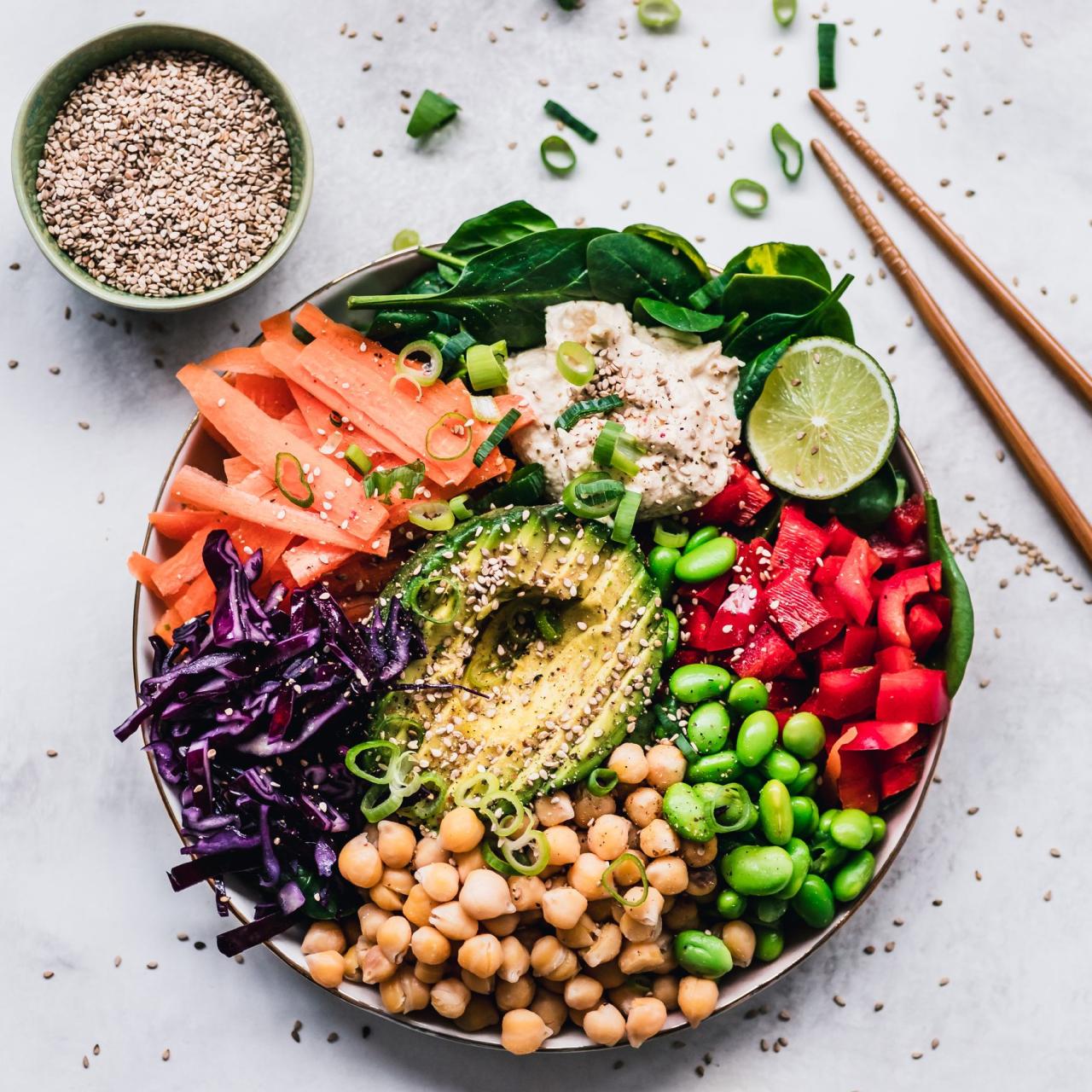As the world delves into the realm of plant-based diets, understanding the types of vegan diets is paramount. From whole-food, plant-based to raw food and fruitarian approaches, this guide navigates the diverse spectrum of veganism, empowering readers with the knowledge to make informed choices that align with their health goals and values.
Embark on a culinary journey as we explore the principles, nutritional benefits, and potential health implications of each vegan diet type, providing a comprehensive roadmap to a plant-powered lifestyle.
Introduction to Vegan Diets
Vegan diets are characterized by the complete exclusion of animal products, including meat, dairy, eggs, and honey. Vegans follow this dietary pattern for various reasons, including ethical concerns about animal welfare, environmental sustainability, and health benefits.
Embracing a pescatarian life offers a balanced approach to nutrition and sustainability. This dietary choice involves consuming fish and seafood while abstaining from meat and poultry. By incorporating fish into your meals, you gain access to essential nutrients such as omega-3 fatty acids, which play a vital role in heart and brain health.
Motivations for Adopting Veganism
Ethical concerns about the treatment of animals in factory farms drive many individuals to adopt veganism. They believe that animals deserve to live free from suffering and exploitation and that consuming animal products contributes to their mistreatment.Environmental concerns also play a significant role in veganism.
Animal agriculture is a major contributor to greenhouse gas emissions, water pollution, and deforestation. By eliminating animal products from their diet, vegans aim to reduce their environmental impact and promote sustainable practices.Health benefits are another motivation for adopting a vegan diet.
Studies have linked vegan diets to a reduced risk of chronic diseases such as heart disease, stroke, type 2 diabetes, and certain types of cancer. Vegan diets are typically rich in fruits, vegetables, whole grains, and legumes, which are all associated with improved health outcomes.
Types of Vegan Diets
Vegan diets encompass a range of dietary patterns that exclude all animal products, including meat, poultry, fish, eggs, dairy, and honey. Within the vegan umbrella, there are several sub-categories, each with its unique emphasis and approach to plant-based nutrition.
Are you looking for a way to improve your health and reduce your environmental impact? Consider adopting a pescatarian life. Pescatarians eat a plant-based diet with the addition of fish and other seafood. This type of diet offers many health benefits, including reducing the risk of heart disease, stroke, and type 2 diabetes.
Plant-Based Diets, Types of vegan diets
Plant-based diets prioritize the consumption of whole, unprocessed plant foods, such as fruits, vegetables, whole grains, legumes, and nuts. These foods are rich in essential nutrients, including vitamins, minerals, fiber, and antioxidants. Plant-based diets have been associated with numerous health benefits, including reduced risk of chronic diseases such as heart disease, stroke, type 2 diabetes, and some types of cancer.
Whole-Food, Plant-Based Diets
Whole-food, plant-based diets take the plant-based approach a step further by emphasizing unrefined, minimally processed plant foods. This means avoiding processed foods, added sugars, and oils, and instead focusing on whole grains, fruits, vegetables, legumes, and nuts in their natural state.
Whole-food, plant-based diets are believed to offer additional health advantages over standard plant-based diets, including improved blood sugar control, reduced inflammation, and enhanced gut health.
Other Types of Vegan Diets

In addition to the three main types of vegan diets, there are several other variations that focus on specific dietary restrictions or philosophies.
Raw Food Diets
Raw food diets emphasize the consumption of uncooked, unprocessed plant-based foods. Advocates believe that cooking destroys enzymes and nutrients, compromising the nutritional value of foods. Raw food diets typically include fruits, vegetables, nuts, seeds, and sprouted grains.
- Potential Benefits:May provide higher levels of vitamins, minerals, and antioxidants, as cooking can destroy these nutrients. May improve digestion and reduce inflammation.
- Potential Drawbacks:Can be restrictive and challenging to follow. May not provide adequate protein, iron, and vitamin B12, which are typically found in cooked foods. May increase the risk of foodborne illnesses due to consuming uncooked foods.
Fruitarian Diets
Fruitarian diets focus primarily on consuming fruits, with a limited intake of vegetables and other plant-based foods. Advocates believe that fruits are the purest and most natural foods and that they provide all the nutrients the body needs.
- Potential Benefits:May be high in vitamins, minerals, and antioxidants. May promote weight loss and improve digestion.
- Potential Drawbacks:Can be nutritionally inadequate, as fruits do not provide a complete range of nutrients, including protein, iron, and calcium. May lead to digestive issues, such as bloating and diarrhea.
Health Implications of Vegan Diets

Vegan diets have become increasingly popular in recent years, with proponents claiming various health benefits. However, it is important to consider both the potential benefits and concerns associated with veganism.
Potential Health Benefits
Research has shown that vegan diets may reduce the risk of certain chronic diseases, including:
- Heart disease:Vegan diets are typically low in saturated fat and cholesterol, which can help lower blood pressure and reduce the risk of heart disease.
- Type 2 diabetes:Vegan diets are high in fiber, which can help regulate blood sugar levels and reduce the risk of type 2 diabetes.
- Certain types of cancer:Some studies have suggested that vegan diets may be associated with a reduced risk of certain types of cancer, such as colon and breast cancer.
Potential Health Concerns
While vegan diets can offer health benefits, it is important to be aware of potential nutrient deficiencies. Vegan diets can be low in certain nutrients, such as:
- Vitamin B12:Vitamin B12 is essential for the production of red blood cells and the functioning of the nervous system. Vitamin B12 is not naturally found in plant foods, so vegans need to supplement their diet with fortified foods or supplements.
- Iron:Iron is essential for the production of hemoglobin, which carries oxygen throughout the body. Iron is found in both plant and animal foods, but the iron in plant foods is less easily absorbed by the body. Vegans need to eat iron-rich plant foods, such as lentils, beans, and fortified cereals, and may also need to supplement their diet with iron.
It is important for vegans to plan their diets carefully to ensure they are getting all the nutrients they need. A well-planned vegan diet can be healthy and nutritious, but it is important to be aware of the potential health concerns and to take steps to address them.
Considerations for Adopting a Vegan Diet
Adopting a vegan diet requires careful planning and preparation to ensure adequate nutrient intake and navigate social and cultural challenges.
Planning and Preparation
Adequate planning is crucial to ensure a vegan diet provides all the essential nutrients. This involves:
- Researching vegan sources of protein, iron, calcium, vitamin B12, and other essential nutrients.
- Reading food labels to identify hidden animal products.
- Meal planning to ensure a variety of nutrient-rich foods.
- Considering supplementation, such as vitamin B12, if necessary.
Social and Cultural Aspects
Veganism can present social challenges, especially in situations involving food. Strategies for navigating these challenges include:
- Informing friends and family about veganism and its benefits.
- Offering to cook or bring vegan dishes to social gatherings.
- Politely declining non-vegan options and explaining the reasons.
- Researching vegan-friendly restaurants and cafes when dining out.
Epilogue

In the tapestry of vegan diets, there’s a vibrant thread for every lifestyle and dietary need. Whether seeking optimal health, environmental sustainability, or ethical alignment, this guide unravels the intricacies of plant-based eating, empowering individuals to make informed choices that nourish their bodies and souls.
Question Bank
What is the primary distinction between plant-based and whole-food, plant-based diets?
While both diets emphasize plant foods, whole-food, plant-based diets prioritize unrefined, minimally processed options, excluding added sugars, oils, and processed ingredients.
Are raw food diets nutritionally adequate?
Raw food diets can be challenging to maintain long-term due to limited nutrient bioavailability and the exclusion of cooked foods that provide essential nutrients.
What are the potential health benefits of vegan diets?
Vegan diets have been associated with a reduced risk of chronic diseases such as heart disease, type 2 diabetes, and certain types of cancer due to their high intake of fiber, antioxidants, and anti-inflammatory compounds.